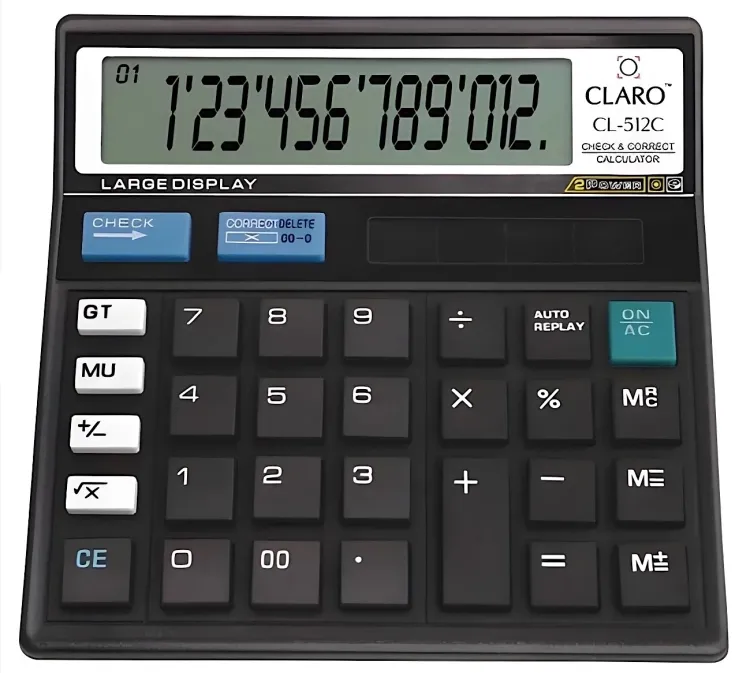Unlocking the Power of Calculators: Types and Applications Explained...!!!
Calculators, electronic devices crafted for performing mathematical operations, range from basic arithmetic to advanced scientific calculations. They've become indispensable in education, business, engineering, and daily life, thanks to technological advancements that have enhanced their power, versatility, and accessibility.

Varieties of Calculators
1. Basic Calculators
Overview: These perform simple arithmetic operations—addition, subtraction, multiplication, and division. They are user-friendly and frequently used for everyday calculations.
Applications:
- Household Finance: Managing budgets, calculating expenses, and splitting bills.
- Retail: Calculating prices, discounts, and taxes in stores.
- Education: Assisting primary and middle school students with basic math problems.
2. Scientific Calculators
Overview: More advanced than basic calculators, scientific calculators handle complex mathematical functions, including trigonometry, logarithms, and exponentiation.
Applications:
- Education: Essential for high school and college students studying algebra, calculus, and physics.
- Engineering: Solving complex equations, analyzing data, and designing systems.
- Research: Performing precise calculations for scientific experiments and studies.
3. Graphing Calculators
Overview: These calculators can plot graphs, solve equations, and conduct statistical analysis, featuring large screens for displaying graphical data representations.
Applications:
- Education: Valuable for students in advanced math courses like calculus and statistics.
- Engineering: Visualizing functions and analyzing mathematical models.
- Research: Graphing data sets and interpreting trends in scientific studies.
4. Financial Calculators
Overview: Tailored for financial calculations, these calculators handle tasks like interest rates, annuities, loans, and investments. They are designed for finance and accounting professionals.
Applications:
- Banking: Calculating loan payments, interest rates, and mortgage values.
- Investing: Analyzing investment returns, bonds, and stock prices.
- Personal Finance: Planning budgets, retirement funds, and savings.
5. Programmable Calculators
Overview: These calculators allow users to write and store custom programs for specific calculations, offering flexibility and functionality beyond standard operations.
Applications:
- Engineering and Science: Automating repetitive calculations and customizing functions for specific projects.
- Education: Teaching programming concepts and enhancing problem-solving skills.
- Research: Performing specialized calculations for unique scientific inquiries.

Benefits and Applications of Calculators
1. Education
Calculators are pivotal in modern education, helping students grasp complex mathematical concepts, perform accurate calculations, and save time on arithmetic. Graphing calculators, specifically, aid students in visualizing functions and data, deepening their understanding of mathematical relationships.
2. Business and Finance
In the business world, calculators are crucial for financial analysis, budgeting, and accounting. They enable quick and accurate calculations of profits, expenses, interest rates, and loan payments. Financial calculators are particularly useful for making informed decisions and future planning.
3. Engineering and Technology
Engineers rely on calculators for designing systems, analyzing data, and solving intricate equations. Scientific and programmable calculators facilitate precise calculations and innovative solutions, while graphing calculators help in visualizing functions and optimizing designs.
4. Research and Development
In scientific research, calculators are essential for performing precise calculations, analyzing experimental data, and developing theoretical models. Programmable calculators, in particular, allow researchers to customize functions for specific inquiries, enhancing efficiency and accuracy.
5. Everyday Life
Calculators also prove useful in daily life tasks like managing personal finances, shopping, cooking, and DIY projects. They simplify calculations, save time, and minimize the risk of errors.
The evolution of calculators into versatile tools addresses a wide array of needs across various fields. From basic arithmetic to advanced scientific and financial calculations, they have become essential in education, business, engineering, research, and daily life. Understanding the different types and uses of calculators can help individuals and professionals maximize their potential, boosting productivity and efficiency.
What's Your Reaction?















